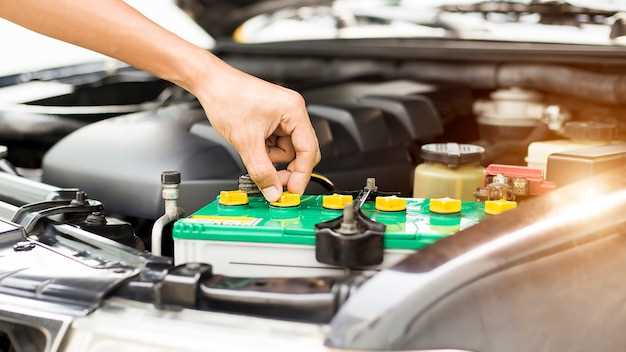
Maintaining the longevity of your car’s battery is essential for ensuring reliable performance and avoiding unexpected breakdowns. A well-functioning battery not only powers the engine but also supports various electrical components, making it crucial for overall vehicle operation. By following several practical tips, you can extend the life of your car battery and save on costly replacements.
One of the most effective tips for prolonging battery life is to regularly check the battery’s connections and clean any corrosion that may accumulate. Ensuring a tight and clean connection helps to maintain a stable flow of electricity and prevents premature wear. Additionally, monitoring your battery’s charge level can alert you to any issues before they escalate.
Another important consideration is to limit short trips. Frequent short drives can prevent your car battery from fully recharging, leading to a decrease in performance over time. Whenever possible, combine errands or take longer drives to give your battery a chance to recover its charge and maintain its health.
Regular Maintenance Practices for Longevity

Prolonging the life of your car battery is essential for ensuring reliable vehicle performance. Regular maintenance practices can significantly contribute to this goal. Here are some essential tips to maintain your battery effectively:
1. Clean Terminals: Ensure that the battery terminals are free from corrosion. Dirt and oxidation can impede the electrical connection, leading to reduced performance. Use a mixture of baking soda and water to clean the terminals gently.
2. Tight Connections: Regularly check the connection of the battery cables. Loose cables can cause starting issues and reduce battery efficiency. Make sure they are secured properly.
3. Test Battery Health: Periodically test the battery’s voltage using a multimeter. A healthy battery should read around 12.6 volts or higher. If the reading is lower, it may be time for a replacement.
4. Avoid Short Trips: Frequent short trips do not allow the battery to fully recharge. Longer drives help the alternator recharge the battery, enhancing its life.
5. Maintain Proper Charge: If you plan to park your car for an extended period, consider using a battery maintainer or trickle charger. This keeps the battery charged and prevents it from draining.
6. Temperature Considerations: Extreme temperatures can affect battery performance. In cold weather, consider parking your car in a garage. In hot weather, avoid leaving your car in direct sunlight to minimize battery stress.
7. Regular Inspections: Schedule routine inspections by a professional to check the overall health of your battery and electrical system. Early detection of issues can prevent larger problems down the line.
By incorporating these maintenance practices into your routine, you can extend the life of your car battery significantly, ensuring reliable starts and overall optimal vehicle performance.
Environmental Factors That Affect Battery Performance
Several environmental factors can significantly impact the performance and longevity of your car battery. Understanding these factors is essential for implementing effective tips to prolong battery life.
One of the most critical factors is temperature. Extreme heat or cold can adversely affect battery performance. High temperatures can lead to evaporation of the battery’s electrolyte, causing damage and reducing capacity. Conversely, cold weather can slow down the chemical reactions within the battery, resulting in decreased power output. It’s advisable to park your car in a shaded or garage area during hot days and use a battery warmer in colder climates to mitigate these effects.
Humidity also plays a role in battery health. High humidity can cause corrosion on terminals and batteries, leading to poor connections, while low humidity can lead to drying out the battery’s fluids. Regular maintenance checks are essential to keep terminals clean and free from corrosion, regardless of the humidity conditions.
The altitude at which you live can influence battery performance as well. At higher altitudes, the air is thinner, which can affect the efficiency of combustion engines and, subsequently, the battery’s performance. If you’re in a region with significant elevation, consider adjusting your driving habits and battery maintenance routine.
Driving habits also relate indirectly to environmental factors. Short trips in extreme weather may not give the battery enough time to recharge. If you often drive in stop-and-go conditions, consider taking longer routes occasionally to allow the alternator to recharge the battery adequately.
Being aware of these environmental factors can help you adopt practical tips to ensure your car battery operates efficiently and lasts longer. Proper care in relation to climate and driving conditions will ultimately enhance your battery’s lifespan.
Signs of Battery Wear and How to Address Them

The health of your car battery significantly affects its life and overall performance. Recognizing the signs of battery wear early can help you address issues before they lead to failure. One common sign is difficulty starting the engine, which may indicate that the battery is losing its charge capacity. If you experience slow cranking sounds when turning the key, it’s time to test the battery.
Another indication of battery wear is the presence of corrosion on the terminals. This white, fuzzy substance can hinder electrical connection and reduce battery efficiency. Regularly inspecting and cleaning the terminals with a mixture of baking soda and water can combat this problem.
Dim headlights or electrical issues, such as flickering dashboard lights, are also clear signs of weakening. These symptoms suggest the battery may not be supplying sufficient power to the car’s electrical systems. In such cases, checking the battery’s voltage with a multimeter can provide insights into its condition.
If you notice a bloated or misshaped battery case, it may have undergone excessive heat or overcharging, reducing its life. In this situation, replacing the battery is often necessary. Always dispose of an old or damaged battery responsibly by taking it to a recycling center.
Routine maintenance is crucial to prolonging battery life. Regularly check the battery’s condition, clean terminals, and ensure that it’s securely mounted to prevent vibrations. Additionally, limiting short trips can help keep the battery charged and reduce wear. When the car isn’t in use for an extended period, consider using a trickle charger to maintain the battery’s charge.




